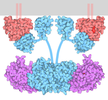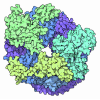+ Open data
Open data
- Basic information
Basic information
| Entry | Database: PDB / ID: 7mff | |||||||||
|---|---|---|---|---|---|---|---|---|---|---|
| Title | Dimeric (BRAF)2:(14-3-3)2 complex bound to SB590885 Inhibitor | |||||||||
 Components Components |
| |||||||||
 Keywords Keywords | SIGNALING PROTEIN / B-Raf / 14-3-3 / B-Raf complex / B-Raf dimer / Active B-Raf / SB590885 / Serine/threonine-protein kinase B-raf | |||||||||
| Function / homology |  Function and homology information Function and homology informationsynaptic target recognition / Golgi reassembly / CD4-positive, alpha-beta T cell differentiation / positive regulation of axon regeneration / NOTCH4 Activation and Transmission of Signal to the Nucleus / CD4-positive or CD8-positive, alpha-beta T cell lineage commitment / negative regulation of synaptic vesicle exocytosis / establishment of Golgi localization / Signalling to p38 via RIT and RIN / respiratory system process ...synaptic target recognition / Golgi reassembly / CD4-positive, alpha-beta T cell differentiation / positive regulation of axon regeneration / NOTCH4 Activation and Transmission of Signal to the Nucleus / CD4-positive or CD8-positive, alpha-beta T cell lineage commitment / negative regulation of synaptic vesicle exocytosis / establishment of Golgi localization / Signalling to p38 via RIT and RIN / respiratory system process / head morphogenesis / ARMS-mediated activation / tube formation / endothelial cell apoptotic process / myeloid progenitor cell differentiation / regulation of synapse maturation / SHOC2 M1731 mutant abolishes MRAS complex function / Gain-of-function MRAS complexes activate RAF signaling / Rap1 signalling / negative regulation of fibroblast migration / positive regulation of D-glucose transmembrane transport / establishment of protein localization to membrane / negative regulation of protein localization to nucleus / regulation of T cell differentiation / positive regulation of axonogenesis / Negative feedback regulation of MAPK pathway / KSRP (KHSRP) binds and destabilizes mRNA / Frs2-mediated activation / GP1b-IX-V activation signalling / stress fiber assembly / face development / MAP kinase kinase activity / thyroid gland development / Regulation of localization of FOXO transcription factors / Interleukin-3, Interleukin-5 and GM-CSF signaling / synaptic vesicle exocytosis / somatic stem cell population maintenance / positive regulation of peptidyl-serine phosphorylation / Activation of BAD and translocation to mitochondria / phosphoserine residue binding / MAP kinase kinase kinase activity / negative regulation of endothelial cell apoptotic process / regulation of ERK1 and ERK2 cascade / SARS-CoV-2 targets host intracellular signalling and regulatory pathways / postsynaptic modulation of chemical synaptic transmission / protein targeting / cellular response to glucose starvation / SARS-CoV-1 targets host intracellular signalling and regulatory pathways / RHO GTPases activate PKNs / Chk1/Chk2(Cds1) mediated inactivation of Cyclin B:Cdk1 complex / positive regulation of stress fiber assembly / sperm end piece / ERK1 and ERK2 cascade / negative regulation of TORC1 signaling / positive regulation of substrate adhesion-dependent cell spreading / Transcriptional and post-translational regulation of MITF-M expression and activity / substrate adhesion-dependent cell spreading / protein sequestering activity / lung development / negative regulation of innate immune response / cellular response to calcium ion / sperm principal piece / thymus development / animal organ morphogenesis / hippocampal mossy fiber to CA3 synapse / TP53 Regulates Metabolic Genes / Translocation of SLC2A4 (GLUT4) to the plasma membrane / Deactivation of the beta-catenin transactivating complex / RAF activation / regulation of protein stability / Spry regulation of FGF signaling / Signaling by high-kinase activity BRAF mutants / Negative regulation of NOTCH4 signaling / MAP2K and MAPK activation / visual learning / cellular response to xenobiotic stimulus / epidermal growth factor receptor signaling pathway / centriolar satellite / Negative regulation of MAPK pathway / Signaling by RAF1 mutants / Signaling by moderate kinase activity BRAF mutants / Paradoxical activation of RAF signaling by kinase inactive BRAF / Signaling downstream of RAS mutants / Signaling by BRAF and RAF1 fusions / melanosome / intracellular protein localization / long-term synaptic potentiation / T cell differentiation in thymus / sperm midpiece / MAPK cascade / T cell receptor signaling pathway / regulation of cell population proliferation / presynapse / cell body / angiogenesis / scaffold protein binding / protein phosphatase binding / blood microparticle / vesicle / DNA-binding transcription factor binding Similarity search - Function | |||||||||
| Biological species |  Homo sapiens (human) Homo sapiens (human) | |||||||||
| Method | ELECTRON MICROSCOPY / single particle reconstruction / cryo EM / Resolution: 3.89 Å | |||||||||
 Authors Authors | Martinez Fiesco, J.A. / Ping, Z. / Durrant, D.E. / Morrison, D.K. | |||||||||
| Funding support |  United States, 2items United States, 2items
| |||||||||
 Citation Citation |  Journal: Nat Commun / Year: 2022 Journal: Nat Commun / Year: 2022Title: Structural insights into the BRAF monomer-to-dimer transition mediated by RAS binding. Authors: Juliana A Martinez Fiesco / David E Durrant / Deborah K Morrison / Ping Zhang /  Abstract: RAF kinases are essential effectors of RAS, but how RAS binding initiates the conformational changes needed for autoinhibited RAF monomers to form active dimers has remained unclear. Here, we present ...RAF kinases are essential effectors of RAS, but how RAS binding initiates the conformational changes needed for autoinhibited RAF monomers to form active dimers has remained unclear. Here, we present cryo-electron microscopy structures of full-length BRAF complexes derived from mammalian cells: autoinhibited, monomeric BRAF:14-3-3:MEK and BRAF:14-3-3 complexes, and an inhibitor-bound, dimeric BRAF:14-3-3 complex, at 3.7, 4.1, and 3.9 Å resolution, respectively. In both autoinhibited, monomeric structures, the RAS binding domain (RBD) of BRAF is resolved, revealing that the RBD forms an extensive contact interface with the 14-3-3 protomer bound to the BRAF C-terminal site and that key basic residues required for RBD-RAS binding are exposed. Moreover, through structure-guided mutational studies, our findings indicate that RAS-RAF binding is a dynamic process and that RBD residues at the center of the RBD:14-3-3 interface have a dual function, first contributing to RAF autoinhibition and then to the full spectrum of RAS-RBD interactions. | |||||||||
| History |
|
- Structure visualization
Structure visualization
| Movie |
 Movie viewer Movie viewer |
|---|---|
| Structure viewer | Molecule:  Molmil Molmil Jmol/JSmol Jmol/JSmol |
- Downloads & links
Downloads & links
- Download
Download
| PDBx/mmCIF format |  7mff.cif.gz 7mff.cif.gz | 201.8 KB | Display |  PDBx/mmCIF format PDBx/mmCIF format |
|---|---|---|---|---|
| PDB format |  pdb7mff.ent.gz pdb7mff.ent.gz | 151.4 KB | Display |  PDB format PDB format |
| PDBx/mmJSON format |  7mff.json.gz 7mff.json.gz | Tree view |  PDBx/mmJSON format PDBx/mmJSON format | |
| Others |  Other downloads Other downloads |
-Validation report
| Arichive directory |  https://data.pdbj.org/pub/pdb/validation_reports/mf/7mff https://data.pdbj.org/pub/pdb/validation_reports/mf/7mff ftp://data.pdbj.org/pub/pdb/validation_reports/mf/7mff ftp://data.pdbj.org/pub/pdb/validation_reports/mf/7mff | HTTPS FTP |
|---|
-Related structure data
| Related structure data |  23815MC  7mfdC  7mfeC M: map data used to model this data C: citing same article ( |
|---|---|
| Similar structure data |
- Links
Links
- Assembly
Assembly
| Deposited unit | 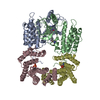
|
|---|---|
| 1 |
|
- Components
Components
| #1: Protein | Mass: 27777.092 Da / Num. of mol.: 2 Source method: isolated from a genetically manipulated source Source: (gene. exp.)  Homo sapiens (human) / Production host: Homo sapiens (human) / Production host:  Homo sapiens (human) / References: UniProt: P63104 Homo sapiens (human) / References: UniProt: P63104#2: Protein | Mass: 84697.695 Da / Num. of mol.: 2 Source method: isolated from a genetically manipulated source Source: (gene. exp.)  Homo sapiens (human) / Gene: BRAF, BRAF1, RAFB1 / Production host: Homo sapiens (human) / Gene: BRAF, BRAF1, RAFB1 / Production host:  Homo sapiens (human) Homo sapiens (human)References: UniProt: P15056, non-specific serine/threonine protein kinase #3: Chemical | Has ligand of interest | N | Has protein modification | Y | |
|---|
-Experimental details
-Experiment
| Experiment | Method: ELECTRON MICROSCOPY |
|---|---|
| EM experiment | Aggregation state: PARTICLE / 3D reconstruction method: single particle reconstruction |
- Sample preparation
Sample preparation
| Component | Name: Active dimeric (B-Raf)2:(14-3-3)2 complex / Type: COMPLEX / Entity ID: #1-#2 / Source: RECOMBINANT | ||||||||||||||||
|---|---|---|---|---|---|---|---|---|---|---|---|---|---|---|---|---|---|
| Molecular weight | Experimental value: NO | ||||||||||||||||
| Source (natural) | Organism:  Homo sapiens (human) Homo sapiens (human) | ||||||||||||||||
| Buffer solution | pH: 8 | ||||||||||||||||
| Buffer component |
| ||||||||||||||||
| Specimen | Conc.: 0.2 mg/ml / Embedding applied: NO / Shadowing applied: NO / Staining applied: NO / Vitrification applied: YES | ||||||||||||||||
| Vitrification | Instrument: FEI VITROBOT MARK IV / Cryogen name: ETHANE / Humidity: 90 % / Chamber temperature: 277.15 K |
- Electron microscopy imaging
Electron microscopy imaging
| Experimental equipment |  Model: Titan Krios / Image courtesy: FEI Company |
|---|---|
| Microscopy | Model: FEI TITAN KRIOS |
| Electron gun | Electron source:  FIELD EMISSION GUN / Accelerating voltage: 300 kV / Illumination mode: FLOOD BEAM FIELD EMISSION GUN / Accelerating voltage: 300 kV / Illumination mode: FLOOD BEAM |
| Electron lens | Mode: BRIGHT FIELD |
| Image recording | Electron dose: 57 e/Å2 / Detector mode: SUPER-RESOLUTION / Film or detector model: GATAN K2 SUMMIT (4k x 4k) |
- Processing
Processing
| Software | Name: PHENIX / Version: 1.19.2_4158: / Classification: refinement | ||||||||||||||||||||||||
|---|---|---|---|---|---|---|---|---|---|---|---|---|---|---|---|---|---|---|---|---|---|---|---|---|---|
| CTF correction | Type: PHASE FLIPPING AND AMPLITUDE CORRECTION | ||||||||||||||||||||||||
| 3D reconstruction | Resolution: 3.89 Å / Resolution method: FSC 0.143 CUT-OFF / Num. of particles: 203343 / Symmetry type: POINT | ||||||||||||||||||||||||
| Refine LS restraints |
|
 Movie
Movie Controller
Controller





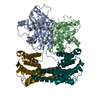
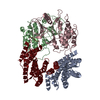




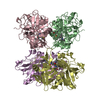
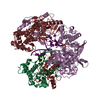
 PDBj
PDBj